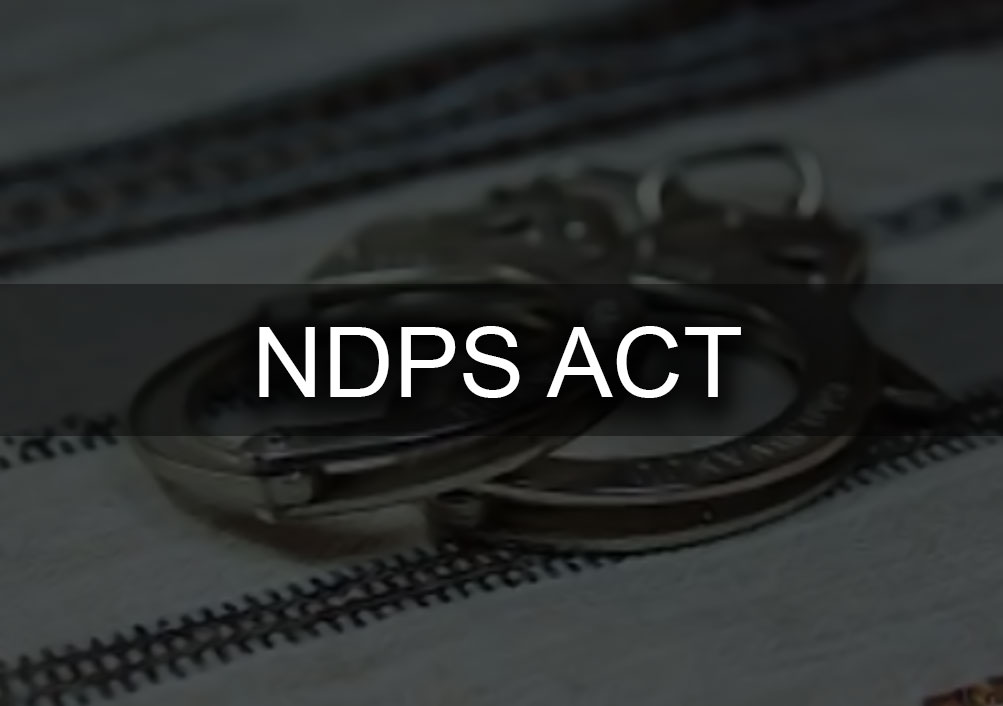In CRM-M-10693-2020-PUNJ HC- Stand that accused is in custody for sufficient time, is not legal ground to overcome rigors of section 37 of NDPS Act at stage of bail: P&H HC Justice Anoop Chitkara [09-05-2022]

Read Order: Lakhwinder Singh alias Toti v. State of Punjab
Monika Rahar
Chandigarh, May 16, 2022: While dealing with a petition seeking bail in a matter involving possession of a commercial quantity of 1,65,000 CLOVIDOL-100 SR tablets containing Tramadol, the Punjab and Haryana High Court has held that the factum of the accused being in custody for sufficient time is not a legal ground to overcome the rigors of Section 37 of the Narcotics Drugs and Psychotropic Substances Act, 1985 (NDPS Act), at the stage of deciding bail plea.
The Bench of Justice Anoop Chitkara also added, “The grounds taken in the bail petition do not shift the burden placed by the legislature on the accused under S. 37 of the NDPS Act. The petitioner has not stated anything to discharge the burden put by the stringent conditions placed in the statute by the legislature under section 37 of the NDPS Act. Thus, the petitioner has failed to make a case for bail at this stage.”
The petitioner, incarcerated upon his arrest for possessing a commercial quantity of 1,65,000 CLOVIDOL-100 SR tablets, containing Tramadol, in violation of the NDPS Act came up before the High Court under Section 439 of CrPC, for seeking bail.
Essentially, in this case, the Inspector of the concerned police station, while patrolling in his jurisdiction, received specific information that the petitioner, along with his co-accused was involved in selling vast quantities of intoxicants. Upon finding the information to be reasonable, an FIR under Sections 21, 22, 25 & 29 of NDPS Act was registered.
When the police party stopped the vehicle, the petitioner along with one of his co-accused was found. The accused desired the search by a gazetted officer, and on this the SP was called, and in her presence, the investigator searched the vehicle and recovered 1,65,000 CLOVIDOL-100 SR tablets without any purchase bills, license, or permission. The FSL found the constituents of the tablet to be Tramadol.
The Cousnel for the petitioner vouched for his relase on bail on the ground that the pre-trial incarceration would cause an irreversible injustice to the petitioner and family. It was also argued that the petitioner was the driver of the vehicle and it belonged to someone else. Also, it was the case of the Counsel that the petitioner was not in conscious possession of the contraband recovered.
But, the State Counsel, on the contrary, while opposing the bail, contended that the quantity of contraband involved in the case fell in the commercial quantity category, and petitioner was thus not entitled to bail.
The Court observed at the very outset that the substance involved in the present case was ‘Tramadol’ and that the quantity greater than 250 grams is specified as commercial quantity and lesser than 5 grams as small. Thus, the Court added that the quantity allegedly involved in this case was commercial and given this, the rigours of S. 37 of the NDPS Act would apply in the present case. The Court held that the burden was on the petitioner to satisfy the twin conditions put in place by the Legislature under Section 37 of the NDPS Act.
Further, on the argument of the petitioner regarding him being the driver and not the owner of the vehicle, the Court observed that this plea taken by the petitioner was not supported by any material/ evidence. Also, regarding the petitioner’s plea pertaining to conscious possession, the Court was of the considered view that the recovery of the contraband was from a vehicle, and the burden was on the petitioner, who was driving it, to point out the place and time, where it was kept in the vehicle, and by whom it was kept.
Furthermore, the Bench asserted, “… this plea would gather force only when the accused establishes the fact after cross-examination, and in the facts and circumstances peculiar to this case, the argument does not satisfy the requirements of section 37 of the NDPS Act.”
Additionally, on the ground of alleged non-compliance of Section 50 of the NDPS Act, the Court opined that it was a matter to be decided by the Trial Court after affording the prosecution an opportunity of being heard and if the Court were to look into this aspect at the stage of bail, it would amount to violation of the principle of Audi alteram partem. Lastly, the Court opined that the stand that the accused was in custody for sufficient time was also not a legal ground to overcome the rigors of S. 37 of the NDPS Act at the stage deciding a bail application.
Justice Chitkara held that the grounds taken in the bail petition did not shift the burden placed by the legislature on the accused under S. 37 of the NDPS Act and the petitioner failed to state anything to discharge the burden put by the stringent conditions placed in the statute by the legislature under section 37 of the NDPS Act.
Thus, the petitioner failed to make a case for grant of bail, held the Court. Accordingly, the petition was dismissed.
Sign up for our weekly newsletter to stay up to date on our product, events featured blog, special offer and all of the exciting things that take place here at Legitquest.




Add a Comment